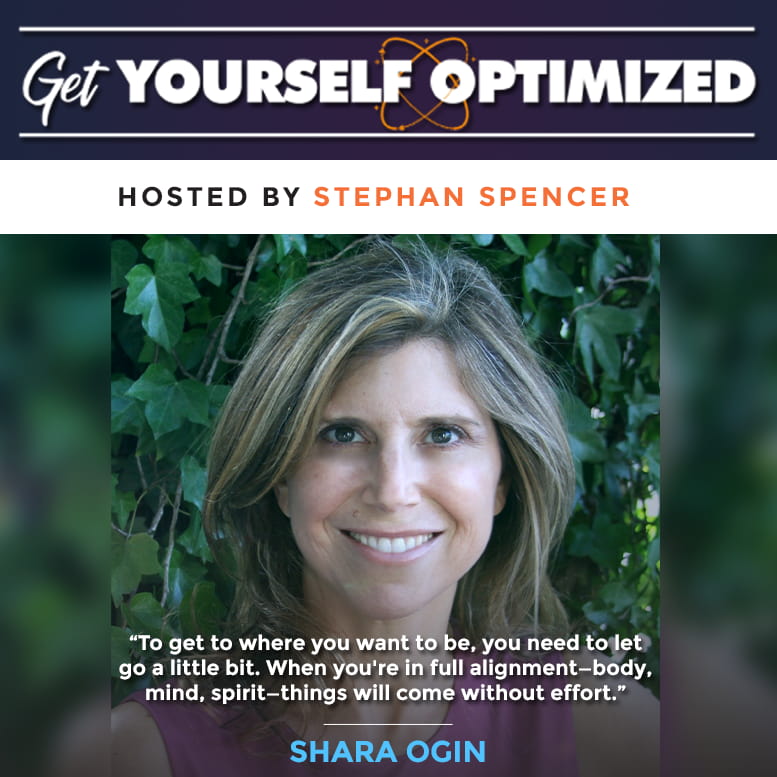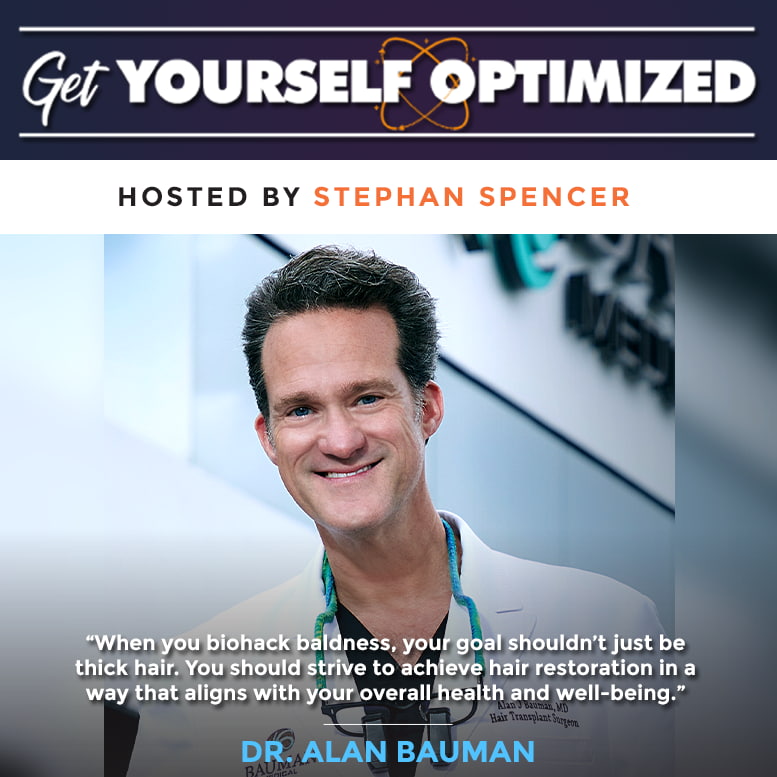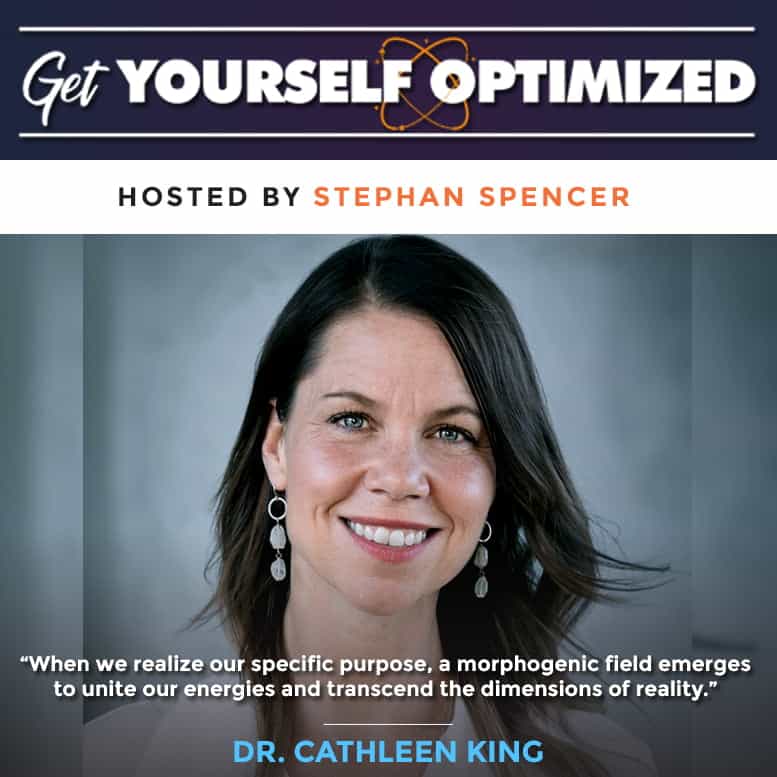Transcript
Jay, it’s so great to have you on the show.
Stephan, thanks very much for having me.
You’re a chemist. Let’s talk about chemistry and why it’s important to our listeners. I presume that you got interested in chemistry when you were young and then you decided, “Let’s make a career out of this.” But tell us a little bit about what your motivation was to get into this line of work.
It actually didn’t go that way. I was studying biochemistry, actually in high school biology. Then in Miami, I came down to study marine biology. I didn’t realize at the time but they stuck everybody in a pre-med program and then you could get your feet wet and marine biology as it were in graduate school. I put up with that for about three years and I found a local University, FIU, who had just started up and they had undergraduate marine biology. I went in with them, I learned more biochemistry than I’ve ever learned it anywhere.
I went on a field trip to Jamaica—and I was also a scuba diver—and my professor asked me to be his scuba diving partner and he was diving for corals. I aced the course down there. I loved it. It was marine biology and marine geology, and I stood out. He said he had some money from a grant, could I be his lab assistant. I said, “Sure.” Then I started studying corals and why this one type of soft coral was so strong in its skeleton – it was a protein skeleton. We finally found out that there were copper requiring enzymes that basically functioned in the human thyroid, but in the corals, they used the same enzyme to toughen the skeleton of the soft corals.
I was studying metalloenzymes, those enzymes that require a metal or a mineral and these required copper—I was studying copper and iron enzymes. To characterize it, to see what kind of an enzyme it was, we would put it in a solution in the lab, and the enzyme would be flat and then we would add copper and the enzyme would take off. That proved that the enzyme was a copper-requiring enzyme.
Then I was working not quite halfway through a master’s program and I met a dentist who’s doing the work I’m doing today with mineral analysis and blood chemistry and looking at them in a different way than most medical doctors look at them. He didn’t know why everything worked but I saw that he was using copper, iron, zinc, and manganese. Studying those, we found enzymes in the blood, the common blood tests that doctors use, that are copper enzymes, other ones are zinc enzymes, and so we would get a profile. He would do a hair mineral analysis, a toxic metal study, and blood chemistry. We would find that the copper was low in the hair and blood and if you give the copper back, the enzymes and the blood come up. It improved the activity of those enzymes.
It’s not just a couple of enzymes you can see on the blood but those are markers for all the copper-bearing enzymes in the body. Magnesium affects all the magnesium enzymes or something like 800 different reactions that need magnesium for their enzymes. That’s where I started and left marine biology, went into human nutritional biochemistry. I’ve been doing this for 42 years and my business, Body Chemistry Associates, for 37 years.
Vitamin C is essential for the body. Every one molecule of adrenaline that we make under stress, we use up one molecule of vitamin C. Click To TweetWow, that’s awesome.
People come to us for a lot of different reasons. Most people come in because they’re not feeling well. We’re the last chance that some people come in for headaches, digestive problems, joint stiffness, mood disorders, kids with hyperactivity, and that kind of thing. Then we test them to find out what it shows. And then we make recommendations based upon their individual chemistry. Some people need more vitamin C or more Zinc. Then we do retest afterward and taper them down. Finally, when the nutrients balance out, we taper them down to a multi. Most people actually begin to feel better in the first month of the program.
This sounds very custom so it’s not like it’s an online course where they learn about how much vitamin C they should be taking and magnesium and all that. They actually need to get assessed first.
That’s the idea and that’s why this works. We have so much good success because we do assess the different nutrients and toxic metals. I couldn’t do it any other way, otherwise, it would be psyched nutrition almost.
Got it. Let’s go through some of the more important different kinds of vitamins, minerals, supplements and so forth that either you’ll end up potentially recommending—not always but sometimes—or that the listener will have heard of in other podcasts for example, or in reading online looking at sites like GreenMedInfo and that sort of thing. Are those the right supplements for them to be taking or not?
I’ll give you an example, this isn’t a supplement per se, it’s a drug actually, but metformin has been recommended by some of my other guests to take as a longevity-type medicine, even if you don’t even have diabetes. I know there are contentious things about that, for example. I know for example that Dave Asprey—who has also been on the show—does not recommend big doses of metformin for those who don’t have diabetes as a longevity approach.
Let’s talk about what are the things that are agreed upon by all biochemists and nutritional biochemist, and what are the things that are contentious and that maybe you would caution our listener about.
First of all, everybody needs more vitamin C than we’re getting in the diet and that’s one that I can say a blanket statement on that. Almost everybody needs more vitamin C than they’re taking because we can’t get enough of it in our food. Humans and other primates are one of five species on the planet that don’t make their own vitamin C, everybody else does. It’s us, the coho salmon, the rainbow trout, and fruit-eating bat, and I think one bird that doesn’t make vitamin C, and every other animal on the planet makes it.
When they make it, they make it a whole lot more under stress. You take a goat that’s happy sitting under a tree thinking happy goat thoughts, it makes 33 times more vitamin C than we’re told to take to prevent scurvy so it makes 33 times, 65 milligrams. That’s at rest. If you stress that goat out somehow—I’m not sure how they do it, chase it around, tell scary goat stories or something—it goes over 200 times that amount in production of vitamin C.
Vitamin C is just essential for the body. Every one molecule of adrenaline that we make under stress, we use up one molecule of vitamin C. The goats and all these other animals just make it to replace it. Vitamin C is important for the eyes, the first highest concentration of vitamin C in the human body is in the adrenal glands where adrenaline is made. The second-highest concentration is in the eyeballs. American Optometric Association is now saying that vitamin C can prevent cataracts.
It helps the brain. There’s a study about Alzheimer’s disease that just 500 milligrams of vitamin C and 400 units of vitamin E gives us 78% less chance of developing Alzheimer’s disease. That wasn’t in a hippy health food store journal or in the archives of Neurology way back in 2002. If you search antioxidants and Alzheimer’s disease, there’s like 8000 articles or bigger. But now, the race is to find an antioxidant drug that won’t kill the people but might also prevent Alzheimer’s disease. But there’s no money in vitamin C and vitamin E.
You mentioned eyesight and vitamin C. I always thought vitamin C was not as much about that but vitamin A was more about eyesight.
Right, you need vitamin A beta-carotene for vision and vitamin C protects the actual physical structure of the eyeball.
We have a formula called Eye Guard that has other herbal antioxidants that help also. Unfortunately, while we’re on that topic, the AREDS formulas that are sold on TV—saying they followed the age-related eye disorder study recommendations—have way too much Zinc in them. When they did the original study and they actually showed improvement in dry macular degeneration, they used 70 milligrams of vitamin C—which I don’t know how often I ever give that amount but it’s very rare and it’s only through testing—but they just blanket copied their whole formula and said, “This worked so we’re going to use this,” not knowing how toxic Zinc can be. If you have too much Zinc, you’ll deplete yourself of copper and that can cause anemia, liver disease, cholesterol going up and all kinds of stuff. Our formula has half of that.
You can definitely get too much Zinc and get problems.
You can get too much with anything, air, and water. And you can die from too much air and too much water.
Yeah, I suppose. I was recommended, at one point by—I don’t even remember who—to get something for my eyesight called OcuVen—a dietary supplement that’s made from marigolds, is that right?
I’m not sure about that one. Marigolds do have some antioxidant and pigment qualities to them.
Yeah, zeaxanthin and lutein. Those come from marigolds, right?
Marigolds are one source, there are others.

Okay. Do you recommend taking supplements that have zeaxanthin and lutein in it?
Especially if you have any kind of advancement in aging qualities in the eyes. It wouldn’t hurt to take them on a preventive basis but there may be some more important things to take. Finally, after you go down the list of what they need, you might have 50 vitamins so we have to deal on how many they’re willing to take and get the most important ones.
Yeah. I heard once that Ray Kurzweil, who’s a famed futurist and longevity expert. He takes something like 200 pills a day, or something, some crazy number, I can’t imagine. How many do you take?
I’ve been taking, let’s see, I don’t know. I don’t count them anymore but I take handfuls.
I take probably about 20 pills a day.
I’m guessing I do that maybe twice a day.
How much vitamin C do you take?
First of all, I used to recommend a thousand for adults and it always should say ascorbate, the buffered form. If it doesn’t say “-ate”, it says ascorbic acid, that can upset the pH of the stomach when you start taking too much. But I’ve taken up orally, I’ve taken up to 10,000 milligrams of ascorbate. Recently, I had been taking about 6000 to 8000. If I’m under heavy stress, I’ll go over to a spa nearby and get an IV of about between 25,000 and 50,000 intravenous.
When I had Dr. Matea on the podcast, she administers these Myers’ cocktail.
That’s B complex, mostly, plus C, plus a few minerals. When this particular spa sees me coming in, they just kind of mix the Myers in with the big dose of vitamin C.
Okay, good extra. I heard that Linus Pauling took a huge amount of vitamin C all the time, Nobel Laureate. He was very keen on vitamin C.
When you say Nobel Laureate, it’s the only person who has two unshared Nobel Prizes in history. One for peace and one for chemistry.
I love that you know that.
Well, 42 years. I study orthomolecular nutrition and all kinds of things. In fact, I’ve got one of his basic general chemistry books right here on my shelf. He was a brain.
Do you recommend our listeners take Myers cocktail or some sort of IV with vitamins in it?
There’s no downside if people do it right. You have to go to somebody who’s been doing it for a while but not everybody needs it. If you have good integrity in your gut, you absorb your B vitamins and you take a B Complex or any multi that has a B Complex and it turns your urine bright yellow, you’re absorbing those B’s. They used to say that, “Man, it was expensive urine,” but you realize that you take a capsule that has B vitamins in it and it gets digested in your stomach, goes in through your small intestine, and into the bloodstream and circulates all the way around and then finally comes out through the urine, that means that when you see yellow urine from the B vitamins, it did its job, it was absorbed very well and made itself available to your whole body tissues.
Yeah, okay. What if you’re not getting that much water? You’re not intaking that much water then your urine is very dark?
It’s dark and more concentrated.
That’s not healthy, right?
No. You want to take enough to make it not so dark. You’re taking B vitamins and they’re really good and you’re absorbing them, it’s almost like a fluorescent yellow. It’s very important to drink good water.
There are different kinds of B vitamins like there’s B12 and methyl B12. I actually had Dr. Ben Lynch on the show talking about methylation and MTHFR and that mutation. For those who haven’t listened to that episode, could you give us a brief recap on what is MTHFR, what’s the difference between regular B12 and methyl B12?
Okay. 5-MTHFR is 5-methylenetetrahydrofolate reductase and anything that ends with an “-ace” is an enzyme. That is an enzyme that converts folic acid to its active form which is 5-methylenetetrahydrofolate, 5-MTHF. You can buy 5-MTHF anytime. I’ve used both folic acid and 5-MTHF and I usually use a little combination but the 5-MTHF, the activated folic acid is the most active. You can test for that enzyme, it’s kind of expensive, I think, the 5-MTHF and see if you have a genetic problem with it. If you do, then you probably won’t do well with just folic acid, you will need the activated form. It skips that step.
Yeah. I actually did the genetic test. I didn’t know this but when you take something like 23andMe, then you can download that raw data and use another analysis tool that looks for things like the MTHFR mutation. I have it so I’m like, “Okay, I need to take methyl B12 then.”
Methyl B12, methyl folic acid is what you need. That’s specifically for folic acid. The methyl B12 is the safest one to take because it’s either methylcobalamin or cyanocobalamin, which is cyanide. It’s better to take the methylcobalamin. That does have some methyl inequalities. There’s another one called trimethylglycine. Now if you don’t have enough folic acid, it shows up in a blood test called homocysteine.
Sugar tastes good but acts badly in your body. Click To TweetHomocysteine—which most doctors don’t even recognize except ones in this field—is a risk factor for heart attack, stroke, Alzheimer’s, Parkinson’s, depression, osteoporosis, and things we haven’t even figured out yet. There are no drugs to treat it which is probably why most doctors don’t want to do it because they don’t know what to do afterward. Basically, a lot of the education comes from the pharmaceutical industry. If they don’t have a drug set up to take care of it, why even order it? Because they’re not aware of the vitamin interaction.
We like homocysteine to be below 8, most labs say below 10. I had a guy come in with a 22 about and he had one stroke. I had a woman come in with like 48 or 46 homocysteine and she had already had 2 strokes but the doctors had never tested for it. It’s easy to bring down giving folic acid and methyl B12. It’s like trimethylglycine or something like that. It starts coming down in a month’s time.
Wow. That’s really important to know this.
Yeah, it brings the risk down as well that quickly.
I think I had my homocysteine levels checked in one of my reasonably recent blood tests, I don’t remember what the score was, but it was normal and that’s something that I should probably keep an eye out on and get on a regular basis like maybe once a year?
Yeah, if you’re getting sixes and sevens, you don’t have to worry about it. If it’s above 8 and below 10, it’s worthwhile taking something. If it’s over the head, you need to really get it down.
Okay. What would you do to get that down?
There are several formulas on the market. We use one that’s a professional formula that it has like 3000 micrograms of folic acid, the methyl folic acid and methyl B12 and trimethylglycine on one capsule.
Do you have a whole range of supplements and vitamins that you sell?
We do and we don’t sell all of them to everybody. Some of them need testing before I’d ever give it to them. We have our multis up and ones that anyone can take.
Okay. I was curious while we were talking, I actually looked up my homocysteine numbers and I’ve got 5.9.
Good for you. I had one of our clients after cardiologist who’s in a big cardiology practice said, “Could you check me for homocysteine?” He turned back around and said, “No, we don’t fool with that.”
Oh, my goodness. I didn’t even get that ordered by a doctor. I just did it on my own. I went to walkinlab.com, decided I wanted to know all these different things. I did some research. I do have some knowledge in this area because I took a Masters in Biochemistry.
I know about the Krebs cycle and stuff but that’s been a long time but yeah, I kind of know about this stuff but yeah, I’m glad that I got these tests and I was all in normal zones for this stuff, the c-reactive protein.
We recommend the highly sensitive HS which is like LabCorp does or the cardio CRP which is what Quest does. Those are the same tests, it’s called different things. You can also get just a CRP done but that’s the total body CRP and the numbers are totally different. The cardio CRP, the highly sensitive one should be less than 1.0 ideally.
I did LabCorp and some Walk-In Lab, you can do LabCorp and c-reactive protein cardiac 0.32, it’s pretty good, right?
Perfect. You’re in good shape.
Awesome. How often do you think a listener should get labs done to check for all these different things? Their triglycerides, and their LDL, and HDL, maybe the NMR, the particle size.
Of those particles.
Yeah. The word just escaped me.
Low-density lipoprotein, it’s a particle.
Cholesterol.
Right.
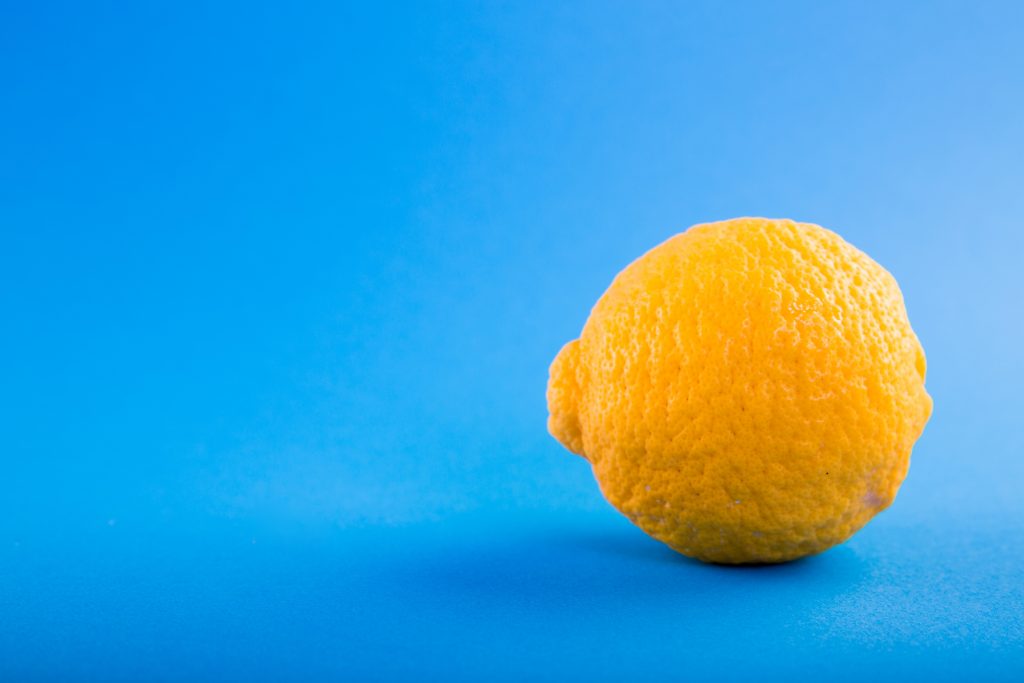
It’s happening more and more.
Or when your mind’s too full of everything, I guess. About cholesterol, we start out with a panel of 50 in our program which anybody can do around the country. We’re in South Florida but we start out with basic 50-panel blood chemistry which includes the lipid panel and homocysteine and A1C for type 2 diabetes and a whole bunch of the chemistry and metalloenzymes. Then if we need to go further than that, then we order extra tests. We can also do the mineral analysis because copper and magnesium and chromium deficiencies can be the cause behind high cholesterol.
One thing that I always say when I have a client come in that says, “The doctor wants me on a statin or prescribed a statin drug for me like Lipitor or Crestor,” I ask him, I said, “Did they also prescribe CoQ10?” 99% of the time, they said no. I said that means that doctor doesn’t know how that drug works or they would be giving you CoQ10.
As it turns out, the enzyme that statin drugs inhibit the liver cells that produce cholesterol also produces Coenzyme Q10. You inhibit that enzyme, it drops down the cholesterol production and then they’re all happy but it also drops the CoQ10 production down. That’s where most of the symptoms and side effects come from when a person was put on statin drugs—muscle pain, muscle weakness, rhabdomyolysis where the kidneys are being affected by the muscle protein coming out which can kill you, a very important muscle in the chest cavity called your heart if you have a CoQ10 deficiency that can cause congestive heart failure and in the brain, that can cause memory loss.
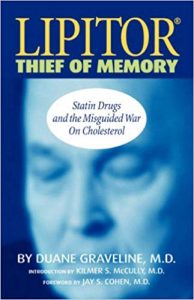
On my radio show, I’ve interviewed a doctor—he’s passed away recently, and that’s probably why I can’t remember his name—but he wrote a book called Lipitor: Thief of Memory. He was an ex-astronaut. He would go out every year to Houston for his physical from his flight surgeon and he, one year, told him to go on Lipitor and he said, “Okay, doctor. I will.” He came back to Florida, started on Lipitor in about three or four days. His wife noticed him wandering around the garden in the back. He looked kind of weird so she went out to him and he didn’t know who she was and who he was. He had suffered transient global amnesia where you lose your total memory and ability to make new memory from time to time.
They thought he had a stroke. They went to the doctor, the neurologist, he said, “No, no stroke,” he said, “Doc, the only other thing I did was I started on those Lipitors.” “No statins, don’t do that.” He said, “Okay,” and he went back home and continued taking it. A week, he was just as bad as he was. His wife said to stop this, and his memory came back.
A year later, he goes back out to Houston to see his doctor. The doctor said, “Your cholesterol is too high. I want you on Lipitor.” And he said, “Doc, the last time I took it, this happened.” The doctor said, “No, statins don’t do that.” He said, “Okay, I’ll try it one more time.” He came back and lost his memory again and so he stopped it and wrote a book called Lipitor, Thief of Memory.
Yeah, Duane Graveline.
That’s it, Duane Graveline.
You have a radio show.
I’ve had one over the years. I’ve been on the radio for about 20 years and I’m off right now. We’re looking for a different station but we’re doing podcasts. We have a YouTube channel where we put on the audio podcast on various different subjects and about three years of radio shows are up on our website under Health Connection Radio.
Okay. What’s the website to send our listeners to?
Okay, our toll-free number is 1-800-CHEMIST and the website is 1800chemist.com.
Okay, cool. Out of all those different interviews that you’ve done and all the guests that you’ve had on your radio show, podcast, and YouTube channel, who’s your very favorite?
Robert Atkins was one of my favorites from way back. He always has a good time talking to me and he wrote some nice things in his book about me and everything. He’s fun. He was a lot of fun to have on. He’s knowledgeable and he was actually right, all the keto diets that people are going with today are based on some of his principles.
Yeah, that’s Atkins Diet he created.
Yeah. Some people said he passed away because he ate a lot of fat but it was in February, I think, and he slipped on the ice. He was trying to stick a landing coming back from launch and he jumped over a puddle but he slipped on the ice and it’s cracked his head and had a cerebral hemorrhage and he died from that.
Julie Whitaker from years ago was on, she’s from California. I’ve had a lot of people on a lot of times and David Perlmutter got on my show.
Humans and other primates are one of five species on the planet that don't make their own vitamin C, everybody else does. Click To TweetI love him. That’s all about how unhealthy the wheat is that we take in our bodies. Is it because of the Roundup, the glyphosate? Or is that just part of the problem?
What’s wrong with glyphosate? Anywhere glyphosate is sprayed, it’s a problem. Whether it’s on wheat or soy or whatever. In fact, Monsanto, who makes glyphosate Roundup did their genetic engineering on soy to make Roundup-resistant soy. It spread around the planet. They’re trying to basically put their brand on foods so that you have to pay them something if you eat their foods. Or even if their soy is across the street from a non-Roundup ready soy batch, if the pollen spreads over there, they say they own it.
Yeah. They will file a lawsuit against, put you out of business as a farmer if you’re trying to grow organic, non-GMO wheat or soybeans, corn, whatever. It’s horrible.
Yeah. Add it to the list.
Now you mentioned earlier in the episode, just briefly, about gut integrity and glyphosate does some bad things to your gut, from my understanding.
Yeah. I don’t know what it doesn’t do damage to, I mean, liver and the carcinogen. I remember my neighbor about 10 or 15 years ago, I saw him spraying something on his weeds and he came over and spraying something on my weeds and my driveway and I said, “What are you doing there?” He said, “No, it’s Roundup,” I said, “No, no, no, no. You keep that. Thank you very much,” and now they’re coming out with a lawyer and saying, “If you used Roundup and had some kind of cancer, call this number now.”
How do you maintain your gut integrity when we just can’t help the fact we’re getting inundated by glyphosate? It’s even in the rain.
It’s everywhere. It’s really important to take antioxidants for one, like vitamin C, vitamin E, and CoQ10, and maybe, resveratrol. Then if it’s just gut integrity, then glutamine helps to patch up a leaky gut. I assume that most people have at least a little bit of a leaky gut, or a lot depending. If I find someone who has acid regurg of any kind, GERD, we have them try some—I call it my secret formula so it’s very expensive—that’s called baking soda. They do baking soda before and after—I have it just for my purposes—to do it before and after a meal just for one week.
A lot of people have had incredible results. Not only does their acid go away, but some people with really bad joint pain had that go away, eczema go away in a week from just alkalizing the gut. Because after your food goes through your stomach, it’s coated with acid. It’s the second stage of digestion. Then it passes into the small intestine, duodenum, where the pancreatic enzymes are released and they further digest down into molecules and you absorb them across these tiny little pores in the small intestine and everything’s hunky-dory.
The trouble is that those pancreatic enzymes don’t work with acid so they get inhibited by the acid coming through the stomach and it turns out that the pancreas is supposed to make and release bicarbonate baking soda. If it does that, then the enzymes work. If it doesn’t do it, the enzymes don’t work. If you have leaky gut, larger than normal holes in your small intestine, you’ll absorb these large protein molecules in there and that’s a very common thing that will have a target reaction in food sensitivity.
We can get rid of food allergy sometimes, it takes a while to patch up a leaky gut, but just by letting those enzymes work with the bicarbonate, it works incredibly well. Some people use Alka-Seltzer Gold instead. That’s on Amazon. But you don’t have to take it before and after every meal forever. It’s just a week to see how it works. Then I have people take it just when they need it and they say it works remarkably well, safer than Zantac, Prilosec, and all those other things.
That’s great. My mother used to take Prilosec. She was told by her doctor to take that. Leaky gut, doesn’t that get exacerbated or become more of a problem if you eat a lot of popcorn?
I’ve not heard that one before.

Somebody told me that, I forget who, but I love popcorn.
I was going to say, “I love popcorn. No, it’s wrong.”
Organic popcorn, though. Now you mentioned food sensitivity and food allergies, that reminds me that Jeffrey Zavik, who referred me to you.
I’ve known him for 100 years.
He’s not quite 100 yet, I don’t think, but he will make it past 100, I’m pretty sure because he follows your advice. He had a great episode about food sensitivity and the difference between sensitivities and allergies. Let’s take for example gluten, gluten intolerance versus gluten sensitivity. There’s just a lot of nuance there. Is there anything that you want to share in particular about food sensitivities that folks should know about?
The most common one we know of is cow milk protein, the casein. They’ve come out with A2 milk which is supposed to only have the good casein in it but I don’t know about that for sure. But cow’s milk protein casein and gluten are number one and two for food sensitivities. Then there’s a whole bunch of other, I mean his lab tests, which one I’ve been using for 30 years or so, has a lot of ability to test other sensitivities that you wouldn’t even think of.
Out of 150 foods, the average is about 10% are sensitive and when people avoid that, their symptoms begin to go away and they’ve gut integrity heals. They’re able to usually try them again in another couple of months. The whole thing is accurate and precise. I’ve tested in my years a couple of different allergy labs and this always comes back the best, the most accurate.
His company is Immuno Labs. I’ve gotten tested by him, or his company as well, get some blood drawn at a local lab. First, you get the kit from Immuno Labs and then they take the blood draw, put it into the box, mail it off, and next thing you know you get your results back. I even have the little card that I have in my wallet. Pretty cool.
Yeah, he’s been doing that very well for a number of years.
He was very excited to have me interview you as you know. He told me that you are one of his go-to people to stay healthy and vital as he gets older. He’s over 60, he’s older and he feels very healthy. He doesn’t get sick. He doesn’t have any major diseases and many people that he knows do, as they age, get these different diseases. It’s a secret weapon, apparently.
People in our program, especially, 60, 70, 80, go into a new doctor and they say, “Okay, give me a list of your medications,” and they say, “Oh, I don’t take any.” “No, I’m sorry. We want a list of what medications you take,” like they have to speak louder or something, they say, “I don’t take any. I just take vitamins and keep myself in shape.” The new doctors and nurses don’t believe that because they’re used to seeing people on 10 different medications. Half of them were to cover up the symptoms of the other half.
Right, then they cause problems when they’re mixed together. What’s that called when you have the drug interactions, is it contraindications?
Contraindication.
Something you had said about metformin, of all the medications for type 2 diabetes, especially now, metformin is the safest but it may not be necessary because no one has a metformin deficiency, but they might have a chromium deficiency.
In the literature, there are about 800 articles if you type in like at pubmed.gov, you type in your search terms of chromium and diabetes and you’ll find 800 somewhat articles that how many have your doctors looked at, and they’re not all 833 as of June 15th.
The one I read out loud on the air is from Biological Trace Element Research in 2013. It says in the abstract, chromium is required for a normal insulin function and low levels have been linked with insulin resistance and it brings down the A1C and serum lipids, all kinds of different things that it helps and chromium can be a deficiency, metformin’s not a deficiency, it’s just a drug to treat what’s going on from the chromium deficiency.
No high cholesterol foods cause high cholesterol in the bloodstream. Click To TweetBut then I say, okay for the endocrinologist, I’m going to say this slowly, chromium is required for a normal insulin function and of the 800 articles, how many have your doctor read if they’re recommending metformin? How many of those has anyone’s doctor read? It’s probably close to zero. They don’t even know that chromium can reverse type 2 diabetes in some cases, usually, we have to do three or four different nutrients. The same thing for magnesium, there’s 800 articles on magnesium, and heart, there’s 200 on magnesium and bone. There’s so much that’s in the standard literature, not as I call them hippy health food store journals, not flyers or not just on the internet but these are scientific studies which are what I depend on.
Yeah. What would you say that just the average consumer of healthcare, all of our listeners, for example, should be in the habit of going to pubmed.gov?
It’s way over their head. Unless you’re used to looking at scientific journals, it’s probably not the best place.
But then you need a trusted source for advice and to debunk the myths and the misinformation out there.
That’s partly why I do it.
That’s why you exist.
Most people come through our program and we’re able to test them individually.
Inflammation is oftentimes thrown around as the bad thing that is causing us to age prematurely and get all these chronic diseases. We got to differentiate acute inflammation and chronic inflammation because it’s the chronic inflammation that causes diseases that seem to be spreading throughout the world, especially in America, and the acute inflammation is what actually will potentially save our lives.
Right. Aches and pains would be acute inflammation. But if you have chronic inflammation in the heart, that’s a real big problem, that’s why we do the CRP level to measure that. I actually named one of our formulas CRP formula because it was so efficient at bringing down the CRP, it’s mostly a couple of good types of turmeric in there but it works and the CRP numbers come down. But inflammation, it was like February of 1985 maybe, or 1990 in Time Magazine, their cover story was on inflammation and how it affects the brain and the body.
First of all, let’s start about the heart, the LDL cholesterol on its own is not that bad even though they call it the bad cholesterol. It’s the oxidized LDL that is the problem. If you take E, C, and CoQ10, they ride the LDL molecule and prevent it from becoming oxidized. Basically, it takes its teeth away. Regular non-oxidized LDL isn’t that much of a problem, it is the oxidized LDL that does the damage to the arteries. That’s another reason why antioxidants help to put out the flame and they help to prevent that. It’s like a blowtorch in your heart. They also prevent the blowtorch in your brain, all the neurotransmitters, especially the catecholamines can undergo what’s called spontaneous oxidation where they turn into a guy with a blowtorch spinning around inside your brain and they burn it out. If you burn out the memory centers, that’s Alzheimer’s, and burnout some of the motor centers, that maybe Parkinson’s, and antioxidants are the best way to prevent that.
How do you get the most antioxidants? What are your nutritional supplements and whole foods that are your secrets to success?
Primarily, the antioxidant for supplements are E, C, and CoQ10 and resveratrol which is an extract from red wine. We have a formula called 1000 Glasses of Red Wine because two capsules provide you the equivalent resveratrol activity. It’s funny that GlaxoSmithKline was at a news story on 60 Minutes probably, 30, 20 years ago. This Canadian company had developed and studied resveratrol and how it prevented heart disease, type 2 diabetes, and Alzheimer’s disease. GlaxoSmithKline started drooling realizing they could make three different drugs out of it, maybe, so they bought the company for three-quarters of a billion dollars back then but they couldn’t make it work unless they kept it just as natural resveratrol. They tried to put side groups on to make one for Alzheimer’s, one for heart, and one for type 2 diabetes.
They couldn’t patent it and block everybody else from using it.
Exactly. When they finally couldn’t do it, they sold the company.
Capitalism, right?
Oh, no, not at all. That means that’s all they were into and that’s what most of the drug companies are into. It’s not like they’re bad people but the people in charge are trying to make money.
But they’re disease maintenance, not cure.
Exactly. It’s a disease system that they find out what’s going wrong and make it better.
Yeah. I read recently about chronic inflammation being caused by red meat, in particular, sugar called Neu5Gc. That is a very strange sugar to our bodies that we can’t process.
Uncured meats, or all meat?
I think it’s all meats.
Okay.
Just red meat. There’s an article in UCSD, the University of California San Diego’s website, UCSD Health. Sugar molecule links red meat consumption and elevated cancer risk in mice. Basically, whatever inflammation sources there are, which could include for example air pollution, we want to reduce.
Absolutely. Then I’ll probably take something to protect it on the inside.
Some sort of protective measure as well as reduced exposure.
I wanted to mention that we also tap toxic metals like mercury and aluminum, those are the most common ones we see these days. Eating fish does not cause high mercury. Some fish have high mercury in them but it’s bound to selenium and that neutralizes the problem because it does not dissociate, it doesn’t break apart and get absorbed. Even though a fish like swordfish and tuna may have high mercury levels, obviously they’re not swimming upside down and banging into walls, the selenium in there that attracted the mercury in the first place is also binding it and keeping the fish safe so you can eat pure mercury selenide and it comes out the other way, mercury selenide, it doesn’t cause mercury poisoning. That’s one myth.
Eating fish does not cause high mercury. Click To TweetAnother one is, you probably know this one, eating eggs does not cause high cholesterol, no high cholesterol foods cause high cholesterol in the bloodstream.
You’re probably not going to endorse people eating a dozen eggs every day for breakfast.
But it wouldn’t hurt. It doesn’t cause high cholesterol. If they’re not allergic to it, it should be fine. It’s always best to eat organic eggs. Dietary cholesterol has virtually nothing to do with blood cholesterol. We know that refined sugar and the cow’s milk protein casein will raise cholesterol. In fact, they used that in some of the early studies to research statins.
Sugar, that’s the white devil.
Right. Tastes good, act bad.
I have a whole episode specifically about sugar. JJ Virgin was the guest and we dove deep into sugar. It’s really a bad addictive substance. As a society, we’re hooked. Even things that we couldn’t even imagine have sugar in them, it does.
How do you restrict your sugar intake?
I feel so bad when I eat it. It’s not hard to stay away.
Is that something that’s always been a problem?
Oh, I grew up on sugar and hardly any protein or fat, unfortunately. I would have sugar-frosted flakes for breakfast, hot cocoa with marshmallows, or cake. My parents would have made me eggs but they didn’t know the difference between protein and carbs, or anything like that.
My grades started going down around fifth grade. Then I somehow got into the University of Miami and they needed money that year, but my SATs were good. I was still having problems and then when I met this dentist who was doing what I do, I just did the test for the heck of it because I was interested in biochemistry. He said, “Oh, you’re really hypoglycemic. You need to stop all the sugar, eat protein at breakfast and take these minerals and vitamins.” I did that within six weeks, it was like I had a brain transplant.
If you come out of a hot shower and you have a cold mirror and it fogs up and you hold a hairdryer on it, it slowly clears. I still remember that happening that just the fog lifted and that was enough to keep my mind going and not want sugar anymore. Plus now, if I have it, I’ll get a headache or whatever, so it’s not worth it.
Right. What a way to start your day to eat a whole pile of sugar with one of these processed cereals. Also muffins, I remember JJ Virgin’s comparing a muffin, calling it a cupcake without the frosting.
That’s right, who stole my frosting?
Back to the heart health thing, if you get a calcium score from that, have you gotten that test?
I have not, no. But people that have a high dairy intake will have a higher calcification in the heart. People that have a magnesium deficiency that we see have a higher calcification calcium score in the heart and refined sugar also.
Okay. I’m sure you don’t recommend milk as a part of somebody’s healthy diet.
Right. Milk, cheese, yogurt, and ice cream from cows or a substitute, it’s like almond milk and non-GMO soy milk, there’s cashew milk, there’s goat milk, goat cheese, sheep cheese, and buffalo mozzarella are all fine.
Okay. I’ll just give you a couple of seemingly random diseases.
Lightning round.
Yes, exactly, because we only have about five minutes left. Acne, what do you do about acne?
Get them off sugar and dairy.
Okay, but if they’re already vegan?
If they’re vegan, they’re probably having too many carbs if they have acne.
That happens a lot though with vegans, I would say, like just going with the processed fake meats and stuff, that can’t be good for you. What do you tell them to take instead?
I would do an analysis to see what they’re low in and then make recommendations but they can’t do garbage sugars or garbage carbs. There are healthy vegetables, fruits, and they may need more fat and protein than they’re eating, I don’t know.
Like a big heaping plate of vegetables would be much better. There’s a lot of research coming out about Alzheimer’s disease and interesting bits of data on things that seem counterintuitive or surprising like one that I saw was that Alzheimer’s has been linked to the bacteria in our mouth that causes gingivitis.
It’s also heart disease has been linked to the bacteria in the mouth but when you have gum disease, the three or four nutrients that we recommend for gum disease are the same ones we recommend for the heart and the brain as well. Magnesium, folic acid, vitamin C, CoQ10 all help the gums and those are the same for that also helped the heart and help the brain because they keep the homocysteine down. I think it’s more of comorbidity rather than a causation.
I don’t think it’s the bacteria. It’s because we got good and bad bacteria in the mouth and you cannot sterilize the mouth, there’s no way you can sterilize the mouth, but they try. This kills 99% of the bacteria, guess what happens when you open your mouth again, you cut them right back in there. It’s the balance that’s important.
Now if you take a Scope mouthwash or something in the morning, my understanding is that it will really lower your capabilities of creating nitric oxide which you need to live. As we age, we get less efficient at it. I take a supplement that’s a lozenge that I dissolve in my mouth, it’s from HumanN, I learned about it from my stem cell doctor. I am for a stem-cell procedure, both me and my wife, Orion. We were supposed to take this Neo40 product for like 30 days prior to the procedure and I actually decided to stay on it. I did some research. It’s really good so I’ve got nitric oxide production every morning through this lozenge. I also have stopped taking mouthwash. Have you heard anything about this?
Not specifically about that. I wrote down the product.
Again, listeners, getyourselfoptimized.com/206. Good bacteria, that includes gut bacteria.
Absolutely.
Do you take probiotics? Do you recommend probiotics?
Yeah, both. Absolutely.
What should folks take? Or do they need to get tested?
I don’t think they necessarily need to get tested, it just has to be a good brand. I don’t know of one of the health food stores, at least, professional brands all the time. We have one called FloraGuard that works really well. When I find something, it works really well, I usually stick with it until the company goes away or whatever. I’ve seen many nutrient companies come and go in 42 years. But just one with a multi-screen probiotic, usually it’s a place to start with high CFU, Colony-forming unit as a number you want to watch out for. We get them from one of the top two laboratories in the country, probably in the world.
Very cool. One more question before we wrap up here, heavy metal toxicity.
Yeah, I was just going to say, for everybody that comes through our program, we screen for lead, mercury, cadmium, and aluminum. The most common ones we see nowadays are mercury and aluminum in children. Aluminum is the most common one, probably coming as the adjuvant in the vaccines. Then I don’t want to come off as an anti-vaccine guy, I’m just anti what the garbage they put in there. Now they’re making some of the vaccines without any aluminum and those have a totally different effect on people. Because we see a direct link between freshly diagnosed autistic kids and high aluminum on our test. We do the hair, blood, urine, and questionnaire. We ask people about their diet and their symptoms in the past history and then we make recommendations for what they need based upon those test results for children and adults.
Then there’s a whole protocol for getting the mercury out of the system. I interviewed Dr. Dan Pompa, do you know who that is?
That sounds familiar but I’m not.
He’s the creator of Cytodetox and that’s a big part of a lot of the protocols out there for reducing heavy metals through collation and then you also use a product called BIND.
I have a little bit of a different approach with toxic metals. I rarely do the challenge tests, I know all the laboratories that do those kinds of things for a long time but through the hair, it is a proper hair sample from a good laboratory. We can see if there are toxic metals in there and selenium and vitamin C, almost always bring them out and they show the different changes and we do follow-up tests down the road.
Is there an example of a patient situation where the numbers came back high from the testing their hair and then you put them on a protocol and then they had a huge improvement in their health?
Almost all of them, I don’t know.
Is there somebody that sticks out in your mind?
There are people that had mercury poisoning for a long time because they had a lot of mercurochrome exposure as a kid or silver shillings in the teeth. When we got rid of the mercury with selenium and vitamin C, basically, and it finally came down to a normal level, they got their brains back, they got their memory back, they felt better, they were in better moods, that kind of a thing.
Kind of what you’re describing of the hairdryer and the fog on the mirror.
That blood sugar and other ones.
Exciting stuff. We really need to be more proactive, I think, as a society in maintaining our health and not just leave it to the doctors to tell us what we should be taking.
If we don’t do it, no one else will.
Yeah, very good. Again, what was your website where people can learn more about you, the supplements, the protocols, and the screening process?
The website and the phone number, the same, it’s 1-800-CHEMIST for the phone number and the website is 1800chemist.com.
Awesome. Thank you so much, Jay. This was really fun, insightful, and inspiring. It was informational so I hope that our listeners will now take some action and pick something from here to do and not just say, “Wow, that was really good information. I wonder what the next episode is.” All right, thank you very much, Jay.
Thank you. I appreciate it.
Thank you, listeners. We’ll catch you in the next episode of Get Yourself Optimized. This is your host, Stephan Spencer, signing off.
Important Links
- LinkedIn – Dr. Jay Foster
- Body Chemistry Associates
- Facebook – Body Chemistry Associates
- Youtube – Body Chemistry Associates
- Health Connection Radio
- Lipitor: Thief of Memory
- Dr. Matea – previous episode
- Dave Asprey – previous episode
- Dr. Ben Lynch – previous episode
- Jeffrey Zavik – previous episode
- JJ Virgin – previous episode
- Dr. Dan Pompa – previous episode
- FIU
- Metalloenzymes
- GreenMedInfo
- Metformin
- American Optometric Association
- Eye Guard
- AREDS formulas
- OcuVen
- Zeaxanthin
- Lutein
- Ray Kurzweil
- Myers’ cocktail
- Linus Pauling
- 5-methylenetetrahydrofolate reductase
- 23andMe
- Methyl B12
- Trimethylglycine
- Homocysteine
- Walkinlab.com
- Krebs cycle
- LabCorp
- Quest
- Low-density lipoprotein
- Lipitor
- Crestor
- CoQ10
- Duane Graveline
- Robert Atkins
- Atkins Diet
- David Perlmutter
- Roundup – glyphosate
- Monsanto
- GERD
- Alka-Seltzer Gold
- Zantac
- Prilosec
- Casein
- Immuno Labs
- Pubmed.gov
- Time Magazine
- GlaxoSmithKline
- Sugar Molecule Links Red Meat Consumption and Elevated Cancer Risk in Mice
- UCSD Health
- Gum disease may be the cause of Alzheimer’s – here’s how to avoid it
- Scope mouthwash
- HumanN
- Neo40
- FloraGuard
- Cytodetox
Checklist of Actionable Takeaways










 About Jay Foster
About Jay Foster
Jay Foster is a Nutritional Biochemist and President of Body Chemistry Associates, Inc., established in 1982. Jay is an expert in the interpretation of blood chemistries and mineral analyses to design nutritional and dietary recommendations, based upon the client’s chemical profile and symptoms. For 37 years, he has successfully helped people with blood sugar disorders, high cholesterol, anxiety, depression, headaches, digestive symptoms, ADHD and more.
Disclaimer: The medical, fitness, psychological, mindset, lifestyle, and nutritional information provided on this website and through any materials, downloads, videos, webinars, podcasts, or emails is not intended to be a substitute for professional medical/fitness/nutritional advice, diagnoses, or treatment. Always seek the help of your physician, psychologist, psychiatrist, therapist, certified trainer, or dietitian with any questions regarding starting any new programs or treatments, or stopping any current programs or treatments. This website is for information purposes only, and the creators and editors, including Stephan Spencer, accept no liability for any injury or illness arising out of the use of the material contained herein, and make no warranty, express or implied, with respect to the contents of this website and affiliated materials.
LOVED THIS EPISODE
Please consider leaving me a review with Apple, Google or Spotify! It'll help folks discover this show and hopefully we can change more lives!
Rate and Review







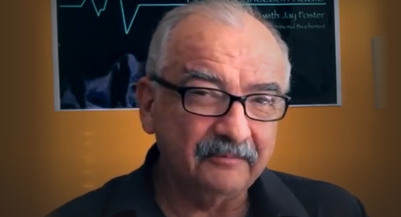
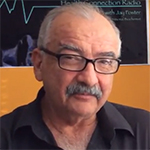 About Jay Foster
About Jay Foster
